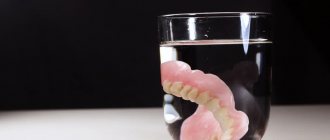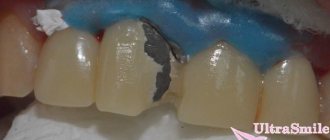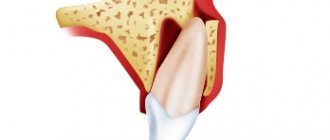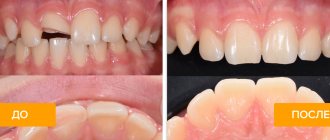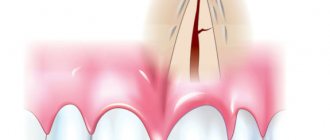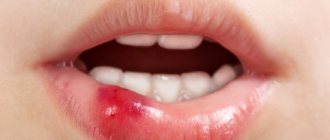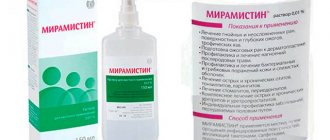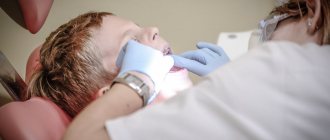At what age is the risk of swallowing a tooth high?
A tooth can fall out and be swallowed as a result of injury, such as an impact from a fall. In such a situation, complete dislocation is possible, when all periodontal fibers are torn and the tooth loses connection with the socket. However, such cases are rare. Most children swallow baby teeth that fall out before the permanent teeth appear. The roots of temporary teeth gradually dissolve, and they fall out painlessly, sometimes even unnoticed. The child swallows them just as unnoticed. This often happens during eating, when the chewing force separates the loose tooth from the gum, and along with a lump of food it is sent into the esophagus.
The most likely age for swallowing a tooth is the period of change from a temporary bite to a permanent one. Each group of teeth changes at a certain age:
- change of central incisors - 5–9 years;
- change of lateral incisors - 7–10 years;
- change of first premolars - 9–13 years;
- change of second premolars - 9–14 years;
- change of fangs - 9–14 years.
Moreover, even such approximate dates are not always observed: they can be influenced by diseases suffered in childhood, nutritional patterns, water quality, and climatic conditions [1, 2].
It should be remembered that the timing of the eruption of both primary and permanent teeth may vary.
A deviation in one direction or another within 6 months is considered normal for a particular child. Vinogradova T. F., Doctor of Medical Sciences, Professor [2]
Prevention of caries in children
Prevention of childhood caries includes several areas, which boil down to proper nutrition, as well as home and professional hygiene.
- Individual oral hygiene. Home hygiene means that as soon as the first tooth hatches, a brush for the baby should appear in a glass next to the parents’ brushes. The same applies to toothpaste. At first, the paste can be applied to gauze or a fingertip to clean your teeth so as not to injure your delicate gums. You need to clean your teeth from all surfaces vertically, then wipe them with a brush soaked in water. Thus, firstly, plaque will be removed, and, secondly, parents will teach the baby to take care of the oral cavity.
- Prevention of caries with the help of a well-chosen diet. As for nutrition, parental duty is to breastfeed the baby from the very beginning. There is no need to talk about the beneficial properties of breast milk, and the sucking process greatly affects the developing jaw system. Then the baby should be accustomed to fermented milk products. By six months, the child should be fed kefir, and later - cottage cheese and cheese. Parents should remember that the main formation and formation of permanent teeth occurs up to 3 years. This means that calcium must always be present in the daily diet.
- Professional oral hygiene. This type of prevention involves periodic visits to the dentist and hygienist. The first visit should occur on your first birthday. The specialist will not only give recommendations for care, but also create a diet regimen and examine the mouth. When the first teeth emerge, you and your child will be shown how to brush their teeth properly at an appointment with a hygienist. If there is a problem such as tartar in children, you cannot do without professional hygienic cleaning. It is important for parents to make it a rule to visit the doctor twice a year. And if there are problems with teeth, then more often - once every three months. This is largely due to the fact that various pathologies develop too quickly in childhood. Meanwhile, early diagnosis will lead to quick, painless and relatively inexpensive treatment of caries.
As you can see, in most cases, when caries can attack children's teeth, parents are able to rebuff it decisively. Of course, there is no escape from genetic predisposition. But it’s not without reason that dental experts say that sweets are the main cause of the development of the disease! So isn’t it better to eliminate the constant source of bacteria and, instead of harmful carbohydrates, offer the child fruits, which are much healthier, after the main meal? Ultimately, your child will thank you in the future for being vigilant and maintaining healthy teeth!
Make an appointment
right now!
Dzedzits Olga Alekseevna
Surgeon, Therapist, Pediatric dentist, Hygienist
Is it dangerous if a child swallows a baby tooth?
The likelihood of swallowing baby teeth is quite high, but such cases do not pose a health hazard. Like other small foreign bodies that have entered the esophagus, the tooth will be removed from the body naturally after passing through the digestive tract. The roots of such teeth have already resolved, all edges are smoothed, and they cannot injure the mucous membranes [4]. Teeth also do not contain substances hazardous to health, and they do not have a toxic effect on the stomach or intestines.
Dentists recommend not to interfere with the natural physiological processes of the body. You should not give a laxative or especially try to induce vomiting: it can cause the tooth to be inhaled into the lungs [5]. And the most important rule is not to panic and not to fuss. A stressful state will inevitably be passed on to the child and harm him more than a swallowed tooth.
Why did the crown fall off?
Most often, the process of swallowing is invisible; a person understands this only after finishing the meal and the absence of an artificial tooth. Usually the cause is the consumption of solid foods, for example, the process of chewing tough meat. If the problem occurs shortly after dental prosthetics, the reason is poor-quality installation and unreliable fixation of the crown. The second option is that the crown fell off after a long time. Most likely, the prosthesis has expired, so the artificial material could not withstand the next load.
First aid for a child if he has swallowed a tooth
The first step is to calm the child down and explain to him that nothing bad happened. This is especially true if the wound is bleeding, since many children are afraid of blood and may consider it a sign of danger. Next you should tackle the hole:
- Biting on a cotton swab for 5–10 minutes helps stop the bleeding. If the bleeding does not stop, you should consult a doctor.
- To disinfect the hole, you can rinse with saline solution or chamomile infusion. It is not allowed to use strong antiseptic and anti-inflammatory drugs without the recommendation of a dentist.
- For healing to occur, the hole needs to be kept at rest: do not eat anything and try not to drink for two hours. Until the next day, it is better to avoid irritating foods: hot, sour, spicy [3, 6].
To facilitate the passage of the tooth through the digestive system, it is worth limiting activity. After the two-hour break in food is over, offer your child raw vegetables, fruits, and whole grains - they will help the tooth move [5].
Typically, it takes 12–14 hours for a tooth to pass through the gastrointestinal tract. If you want to control its output, you can give your child some corn kernels. They leave the intestines unchanged, and their presence in the stool will be a signal that the tooth has also left the body [5].
Binge eating
This mistake is made by people who are not familiar with the structure of the digestive system. The only option when this solution can be partially correct is that the tooth is stuck at the end of the esophagus and you feel it somewhere above the stomach.
You can eat a small piece of black bread (white is more sticky), fruit or vegetable (preferably with a dense consistency). If after this the sensations do not change in any way, try again in half an hour. You can drink water.
Important! Feelings can be distorted by worry and anxiety - there have been cases when people, frightened by far-fetched threats, feel pressure and scratches from within that are not there. You can check your condition with a moderate sip of water.
In addition, a swallowed crown or other metal element of dental corrective structures will not be visible on an x-ray due to the large amount of food in the stomach and waste in the intestines.
When to worry
Lost teeth in the digestive tract are harmless. However, in very rare cases, swallowed small objects, including teeth, may enter the respiratory tract instead of the esophagus. This situation carries serious risks and may require emergency medical attention. To rule it out, monitor your child after swallowing a tooth. You should be alert to the following signs:
- difficulty swallowing;
- increased salivation;
- cough or wheezing;
- neck or chest pain;
- nausea and vomiting;
- blood in vomit or stool;
- abdominal pain;
- heat.
Any of these symptoms is a reason to immediately consult a doctor [7].
Are there medications that will improve the situation?
There are no solutions aimed at solving this specific problem. Such medications are not sold because the problem is not significant and will soon resolve itself or with minimal help from doctors.
Under no circumstances should you use drugs that artificially speed up digestion - this will cause no less harm to the body than vomiting.
Dehydration, stopping the healthy digestive process, pain, loss of appetite - all these symptoms can appear if you take the drug without appropriate indications.
If the tooth is severely stuck and scratched, no medications will help - go to the emergency room, where foreign objects are pulled out of the esophagus every day. This can only be done by a professional physician who knows how the esophagus works and will not damage it. If you don’t want to wait in line at the clinic and search for the right office, you can find a private dental office - usually there is at least one of these in every area.
Preventive measures
To reduce the risk of swallowing, ask your child to report loose teeth immediately. Then you can monitor the process of loosening and intervene if necessary. If at least one milk tooth is mobile, every time before eating it is worth reminding the child to be careful and try not to bite or chew with this tooth.
It would also be a good idea to take measures to prevent impacts that could lead to teeth being swallowed. Active play of young children should be supervised and they should be provided with high-quality equipment for sports: masks, helmets, and mouthguards.
Maybe you shouldn’t treat the tooth, but just remove it?
It will be easier to persuade a child to treat a tooth than to remove it. Even under the influence of modern anesthesia, the patient does not lose tactile sensitivity (no pain occurs, but there is rocking and pressure). Children can perceive such sensations as pain. Medical manipulations during dental treatment are much more gentle. Also, with the early loss of one tooth (and especially several), it can cause problems with speech and malocclusion. Do not forget also about the psychological aspect: very often children who do not have front teeth begin to be teased by their peers.
Should I worry?
Panic attacks are inappropriate here, because the unit could be very unsteady. Therefore, during meals, when children put pressure on the organs, they often fall out. Mothers are worried that they will damage the baby’s internal organs. Dentists say that when a child swallows a tooth, it is not dangerous for him. The structure of temporary crowns is fragile and soft. Therefore, when the baby ate a tooth:
- Parents should take this calmly.
- Mothers should feed their child a hearty breakfast or lunch.
- Don't miss your baby's potty trip.
- Check to see if there is a tooth in the pot.
Mothers calm down when “the missing item is found.” True, this does not always happen. There may be no crown in the pot. Where is she? Milk organs are not durable. If there is a calcium deficiency in the body, the chewing organ could be digested. In this case, the body has replenished the deficiency of a useful mineral. The next day you need to take tests to determine the amount of calcium in the body. Contact your pediatrician, he will assess the situation and prescribe therapy.
The child swallowed a lost baby tooth, which means that a bleeding wound could have formed at the site of growth. First of all:
- Have your baby rinse his mouth with an antiseptic solution without alcohol or clean water.
- Blood can be removed from the wound if the child bites on a gauze swab.
- After this, do not feed the little one for 40-50 minutes. Don't give him hot or spicy food for a while.
- If the baby has experienced a fright, calm the child down, be kind and gentle with him. Explain to your child that it is safe.
It is important that parents do not make a tragedy out of this event. Approach this issue with optimism. Most children are afraid to pull out loose crowns, but they constantly touch them with their hands and tongue. It is important that the child does not choke when the “pearl” comes off.

